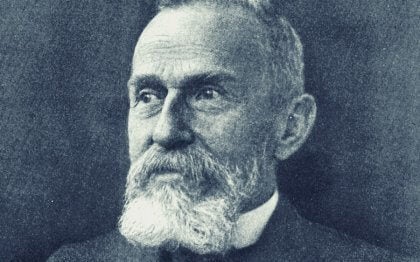Emil Kraepelin’s name is one of the most important in the history of medicine, he is basically considered the father of modern psychiatry, as well as psychiatric genetics and psychopharmacology, in fact, he was the main driver of so-called biological psychiatry, which considers mental illness as an essentially organic subject.
Although Emil Kraepelin formulated his theories in the early twentieth century, all these assumptions remain valid for a significant number of psychiatrists today. It should be noted that he was also severely questioned for his “scientificism. “Excessive, however, no one dares to ignore their contributions.
- “Whoever seeks a psychiatrist for the evils that afflict him is a sick organism.
- Marked by the dysfunction of its constituent parts.
- Or is he an individual who inhabits the world of language and whose body receives its indelible marks from this universe?-Unknown author-.
Emil Kraepelin strongly opposed the concepts of Sigmund Freud and psychoanalysis, a channel that was fashionable at the same time as he researched, but was also interested in topics typical of psychoanalysis, such as the interpretation of dreams.
Emil Kraepelin was born on 15 February 1856 in Germany, studied medicine in several institutions, mainly in Leipzig, and since beginning his training he has shown great interest in the phenomena of the human spirit, which led him to take a course in experimental psychology with Wilhelm Wundt, the creator of this current, who later became a psychiatric assistant.
Kraepelin was formed in 1874 with a thesis entitled “On the Influence of Acute Diseases on the Genesis of Mental Illness”. He then studied neuropathology and began researching psychopharmacology and psychophysiology. He also worked in several psychiatric institutions at the time and became a professor at the University of Dorpat (now Estonia) in 1886.
In 1922 he was director of the Institute of Psychiatric Research of the city of Munich, at that time his fame was already international, he had evolved a lot in his proposals, with very detailed research and exhibitions, which collected insightful observations on the so-called “mentally ill”.
Emil Kraepelin’s first major book published was “Psychiatry Compendium”. In this work, he made hundreds of clinical observations based on the countless cases he had seen in psychiatric institutions.
It was a pioneering job in psychiatry. He described the symptoms in detail and sought to classify mental illnesses according to their observable manifestations, he was only 27 years old when he produced it.
The second and third editions of this book are no longer called “Compendium” and were called “treated”. Emil Kraepelin included in these editions the concept of disease evolution, which has become decisive in the realization of differential diagnoses, and also introduced a chapter on catatonia.
Between the fourth and sixth editions also emerged the concept of degenerative psychic processes. These included catatonia, early dementia and paranoid dementia. He also introduced the concept of “manic-depressive madness. “
The truth is that in each edition he developed and clarified the different mental illnesses. The eighth edition had more than 2,500 pages.
One of the most interesting chapters in the history of mind science was one in which Emil Kraepelin saw a patient, Sergei Pankejeff, become famous, whom Kraepelin treated unsuccessfully, diagnosing that he was “manic-depressive”. So seen by Sigmund Freud, does that inscribe him in the history of psychoanalysis with the nickname “the werewolf”?and diagnoses him as an “obsessive neurotic. “
The truth is that Kraepelin’s classifications are the basis of modern psychiatry, in his day he prevailed over all other theories and gained enormous prestige, Emil Kraepelin wanted psychiatry to acquire a more scientific and solid status, so all his work has an impressive rigor.
Kraepelin was also interested in the study of mental illnesses in other cultures, in this way he laid the foundations of what would be ethnopsychiatry and cultural psychiatry, in fact, he has visited Mexico, Spain, Indonesia, India and the United States on several occasions . occasions to collect information. He called his research “comparative psychiatry. “
Emil Kraepelin died at the age of 70 in Munich, Germany. Much of modern psychiatry is based on his work. Although this perspective has been questioned by various currents of thought, even today, many psychiatrists remain zealously following their postulates.

